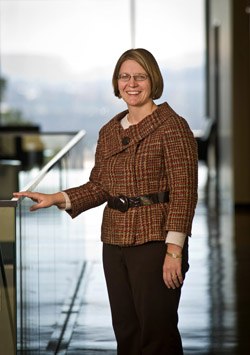Economist Tells Crowd that Arkansas Growth is Still Proceeding Moderately
by January 30, 2015 3:13 pm 115 views

The Arkansas economy in 2015 will reflect the upward trends that have helped the United States economy to new unemployment highs.
That was the message Friday from economist Kathy Deck during the 21st annual Business Forecast luncheon, attended by more than 1,000 business and community leaders at the John Q. Hammons Convention Center in Rogers. The program is hosted by the Sam M. Walton College of Business at the University of Arkansas.
Deck said the rate of employment growth in the state will continue to lag that of the nation and that the Arkansas economy will show modest growth in 2015.
She added that there’s probably no more important economic number right now in Northwest Arkansas than wage growth.
“I think that when you have a low unemployment rate like we’ve got here, employers are going to have to recognize what that means,” she said. “They have to recognize that to keep the talent they are going to need to do whatever it is that they do, wages are going to have to react to that.”
She also explained that the state’s industrial mix and workforce quality are the keys to both short- and long-term prosperity within the state.
“The forecast for Arkansas in 2015 is one of reasonable growth,” Deck said. “By the end of the year, Arkansas will be very close to reaching its prerecession employment high. Northwest Arkansas continues to grow, although there has been some job loss in the key trade, transportation and utilities sector.
“The restructuring of some of our key companies will set the stage for measured job growth in 2015.”
Deck is the director of the Center for Business and Economic Research at the Walton College, which coordinates the annual luncheon so that leaders can hear top economists give their insight into the economic conditions in the state, nation and world over the next year.
Deck was one of three economists who presented at Friday’s luncheon, joining Carl Tannenbaum, chief economist for The Northern Trust, and John Silvia, managing director and chief economist for Wells Fargo.
“I am excited about what took place today,” said Eli Jones, dean of the Walton College. “To be able to have Carl Tannenbaum here in Northwest Arkansas to talk about what is going on globally, I learned a lot.”
John James, the founder of Fayetteville-based company Acumen Brands Inc., whose portfolio of e-commerce sites includes Country Outfitter, was the moderator of the event. He told the audience that the way for companies to proceed in 2015 is through disruptive innovation, a “buzzword” business strategy that transforms a market, or creates a new one through simplicity, convenience, affordability or accessibility.
“The fate of Arkansas is tied to whether companies are disruptive or are being disrupted,” he explained.
Deck agreed, adding that disruption isn’t a strategy solely for emerging companies.
“Our existing companies should be disrupting, as well,” she explained. “They should be restructuring and alert for new competitors and doing what is necessary to be lean and mean. They don’t want to be reactionary. They need a structure in place that allows them to be positioned for success.”
Other insights shared by Deck at the luncheon include:
- In 2013, growth in Arkansas per capita personal income just kept pace with growth in the U.S. average. The latest measure in Arkansas stood at 81 percent of the U.S. average.
- Arkansas gross domestic product (GDP) continued to be more concentrated in agriculture, construction, manufacturing, trade and transportation, management of companies, other services and government than the U.S. average.
- The pace of employment growth in Arkansas means that by the end of 2015, the state should just have reached its prerecession employment highs.
- There were net job losses in the financial and information sectors in Arkansas in 2014.
- Despite these losses, the unemployment rate in Arkansas has fallen to 5.6 percent from its post-recession high of 9 percent.
- Although the Arkansas labor force declined on a year-over-year basis for every other month in 2014, in December the labor force was higher than it was at the same time in 2013.
- In 2014, employment growth was positive in central Arkansas, Northwest Arkansas and Jonesboro, but negative in Pine Bluff and Fort Smith.
- In Northwest Arkansas, the manufacturing, trade, transportation and utilities and information sectors had employment declines on a year-over-year basis in 2014, but overall employment grew by 1.4 percent.
- Economic growth in 2015 will continue to be led by construction, leisure and hospitality and professional and business services.
